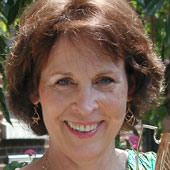An American in Poland, Anno 1983: In Warsaw (Part IV)
What kind of restrictions were placed on the Polish people in 1983?
November 26, 2009
Warsaw is modern but not pretty.
Lots of high-rise buildings, without much architectural character — mostly boring socialist realism.
The hotel was partly dirty and smelly. The johns in Poland are for the most part awful. Plumbing is old.
Tuesday
We attended a ceremony commemorating the Warsaw Ghetto Uprising in 1943. Then on to Paviak, the Gestapo headquarters in Warsaw.
After that, we traveled with Fiotr Swak to the old town and saw the old castle. There we found solidarity flower wreaths in the form of a cross. These lie in towns all over Poland and stand as a form of resistance. Every once in a while the police come by and spray them away with their hosepipes.
Next we saw the old cathedral, and visited the church where Chopin's heart is buried in a column. On the column is written a quote from Matthew, "For where your treasure is, there shall your heart be also." Then on to the culture palace, which is a huge Soviet architectural feat.
Inside, Piotr read us the inscription: "To the memory of the eternal friendship between the Soviet and the Polish people." When Piotr read the word "eternal," he put his hand to his throat to indicate its being cut, in a moment of black humor.
The park where the famous Chopin monument stands is made in the Jugendstil (art nouveau) style. Chopin sits on a huge boulder and looks dramatically over his shoulder (Piotr said he was looking away from the Polish parliament!).
The parliament houses in Warsaw are white, neoclassic buildings that look like some of those in Paris, London and Washington.
Later, we went to Piotr's apartment for tea. He hopes the pope's coming visit will get people "back on their feet again," and lessen the apathy.
He is very pro-Solidarity. He told us about the news of the 39 Americans that were killed in the Lebanese capital. He reports that among his friends and acquaintances, he has never heard anything against Reagan, NATO and the sanctions.
Then we went to Barbara's for supper. She inherited the apartment from her grandmother. She has been waiting for a telephone for 12 years. Usually, Poles have to wait 20 years for a place to live.
Wednesday
We travel to Tarnow, in southern Poland, not far from Cracow. There is beautiful scenery along the way, fields plowed perfectly, all with horses and wagons. We're back in the 19th century.
In Tarnow, we visited a band of gypsies we knew of there. We gave them a load of baby food and they put on a show for us that evening in a Gypsy nightclub in the town. They played bass, guitars and violins.
With the vitality for which they are famous, the gypsies put the spirit of composers like Chopin, Dvorak, Janacek into their music. Our fellow student from Iran, Shokar, danced Eastern-style dances with a gypsy lady.
Meanwhile, the children danced the 'duck dance' popular last year in West Germany. Some things apparently do seep through the borders. They serenaded us as we drove away and gave the women hyacinths with ribbons and greenery.
When we arrive in Cracow, we are blessed, at long last, with a slower tempo.
In the castle, the trumpet from the Church of the Virgin announces every hour in the four directions — representing hundreds of years of tradition.
The American flag flies at half mast from the U.S. consulate.
At dinner, we were not supposed to let our official handler know that we had unofficial plans to meet friends. We met Tadek, Halina and their daughter at Nova Huta and went through an amazing church.
We then visited the Maximillian Kolbe church in Nova Huta, which was newly built to hold 4,000 people. Outside, women were rationing out flour from sacks. Each sack said, 'This flour is a gift of the people of the United States of America. Not to be purchased or sold."
Tadek, who was in prison for over a year because of his Solidarity activities, came up alongside of me, pointing to the bags, and said, in broken English, "You see?"
Children are all over the place. Poland is what the Germans would call "kinderreich" — richly endowed with children.
Halina told me that Stasjek, a young lawyer whom I had met on the last trip — and who has been studying in Amsterdam this year — will return to Poland at the end of April. This is probably the last time he will be allowed to be in the West.
From now on, only people who have links to the party will be allowed. He has also lost his job and cannot return to his hometown to work.
Editor’s Note: This is the fourth installment of a five part series. Read Part III here.
Takeaways
Children are all over the place. Poland is what the Germans would call "kinderreich" — richly endowed with children.
In the castle, the trumpet from the Church of the Virgin announces every hour in the four directions — representing hundreds of years of tradition.
We travel to Tarnow, in southern Poland. There is beautiful scenery along the way, fields plowed perfectly, all with horses and wagons. We're back in the 19th century.
